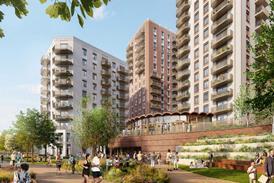- Home
- Intelligence for Architects
- Subscribe
- Jobs
- Events

Events calendar Explore now 
Keep up to date
Find out more
- Programmes
- CPD
- More from navigation items
Have we passed peak London?

‘London is going to become a lot scruffier,’ Yolande Barnes tells Ben Flatman
In 2017 I wrote a piece arguing that we should not take London’s success for granted. Amid concerns about housing shortages and affordability, I asked whether, rather than relentless growth, a bigger risk might not actually be unforeseen decline. Although at that time the threat to the City from Brexit was already clear, I definitely did not anticipate the current crisis and the impact it would have. Now, in the space of a year, covid has made packed Underground carriages and an overcrowded Oxford Street seem like the distant and even fondly recollected memories of a lost London.
Underlining the dramatic changes, a recent report suggests that London may have lost 700,000 foreign-born residents since the start of the covid crisis. That’s 8% of its population. The last time London saw a dramatic fall like that was during the Second World War, when millions fled from Nazi bombs. Amazingly, the city’s population only recovered to its 1930s peak in 2015. This time it looks like many have left because their jobs in hospitality and retail have disappeared. Or because they have discovered that they can work more comfortably from somewhere else. Largely as a result, London rents (although not house prices) dropped by around 7% in the 12 months up to October 2020.
When I spoke to Professor Yolande Barnes of the Bartlett’s Real Estate Institute recently, she reminded me that London was already showing signs of cyclical population decline even before 2020.
…
This content is available to registered users | Already registered?Login here
You are not currently logged in.
To continue reading this story, sign up for free guest access
Existing Subscriber? LOGIN
REGISTER for free access on selected stories and sign up for email alerts. You get:
- Up to the minute architecture news from around the UK
- Breaking, daily and weekly e-newsletters
Subscribe to Building Design and you will benefit from:

- Unlimited news
- Reviews of the latest buildings from all corners of the world
- Technical studies
- Full access to all our online archives
- PLUS you will receive a digital copy of WA100 worth over £45
Subscribe now for unlimited access.






